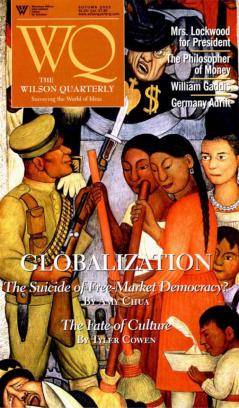Two Faces of Globalization


A Survey of Recent Articles
A Survey of Recent Articles
James Madison's politics may have been more consistent than many critics have suggested.
Congress's popularity seems to depend less on public involvement in the political process than on the morality of the representatives.
Surprisingly, more than half the government agencies created since 1946 have ceased to exist.
More than just an ocean separates America from its European allies.
The 1991 Persian Gulf War demonstrated that the U.S. Army is in urgent need of reform. So why hasn't it happened?
American foreign aid operates much like a business cartel--and that's not good.
Reuniting North and South Korea may not be such a good idea.
Whatever happened to shareholder value?
Strategic planning is a staple of corporations. So why does it often fail?
Why economic theories don't always balance out.
Why nurses are in short supply.
Why the conventional wisdom about urban sprawl is wrong.
Both sides criticize the media's coverage of the Israeli/Palestinian conflict
The Crusades have been much in the news of late, but their legacy is misunderstood.
The Torah and the Talmud do not receive the credit they deserve as the source of much early thinking on liberalism.
Despite some remaining obstacles, wind power finally seems poised to come into its own.
Remembering a device that has saved countless lives.
W. C. Fields spent his entire show business career, from stage to screen, perfecting his role of consummate con man.
THE SOURCE: "Why Dickens Wrote A Christmas Carol" by Michael Timko, in Current, March–April 2002.
The history of "literary journalism."
What's behind the disturbing recent violence against Jews in France.
Bulgaria's problem is not too little democracy, but ineffective democracy.
Intellectual freedom lags far behind market reform in China.
Sierra Leone continues to struggle with its colonial legacy.
Saudi Arabia is having a difficult time curtailing the Internet.
"Murder Mystery" by John Buntin, in Governing (June 2002), 1100 Connecticut Ave., N.W., Ste. 1300, Washington, D.C. 20036.
on George Orwell
on Philip Johnson
The Undamming of America. By Elizabeth Grossman. Counterpoint. 320 pp. $27
By Philip Fisher. Princeton Univ. Press. 268 pp. $26.95
By Steven M. Wise. Perseus. 322 pp. $26
By T. J. Stiles. Knopf. 512 pp. S27.50
By Charles Perrow. Princeton Univ. Press. 259 pp. $34.95
VIDA CLANDESTINA: My Life in the Cuban Revolution. By Enrique Oltuski. Wiley. 276 pp. $24.95
INSIDE THE CUBAN REVOLUTION: Fidel Castro and the Urban Underground. By Julia E. Sweig. Harvard Univ. Press. 302 pp. $29.95
Bv John P. Jackson, Jr. New York Univ. Press. 289 pp. $45
By Toby Young. Da Capo Press. 340 pp. $24
By Herman Gollob. Doubleday. 341 pp. $26
MEASURING AMERICA: How an Untamed Wilderness Shaped the United States and Fulfilled the Promise of Democracy. By Andro Linklater. Walker. 288 pp. $26
SKEPTICAL ENVIRONMENTALISM: The Limits of Philosophy and Science. By Robert Kirkman. Indiana Univ. Press. 212 pp. $19.95
At 100, Leni Riefenstahl--"Hitler's filmmaker"--is indeed her own monument, the diva who won't go away.
A struggle is under way for the soul of Berlin.
With the debate about globalization focused on economics and politics, Amy Chua raised an alarm in our Autumn 2002 issue about the dangerous escalation of ethnic tensions in many countries caused by the triumph of free-market democracy. Chua later wrote Battle Hymn of the Tiger Mother (2011).
Belva Lockwood's campaign for the presidency in 1884 may have been quixotic, but it was historic, too, and as spirited and principled as the candidate herself.
The united Germany has lived up neither to its own hopes nor to the fears and expectations of its neighbors.
Gaddis was a great American novelist, who failed to attract a great American audience. Perhaps that's to his credit.
[Introduction to "cluster" of articles on Germany.]
A century ago, the German thinker Georg Simmel (1858–1918) wrote a brilliant and nuanced book on the tradeoffs of life in a market society. If he had called it Capitalism and Its Discontents, Simmel might be famous today. As it is, The Philosophy of Money sharply illuminates many of the perplexities of capitalist life at the dawn of the 21st century.
[Introduction to "cluster" of articles on globalization]
On one thing the whole world seems to agree: Globalization is homogenizing cultures. At least a lot of countries are acting as if that’s the case.